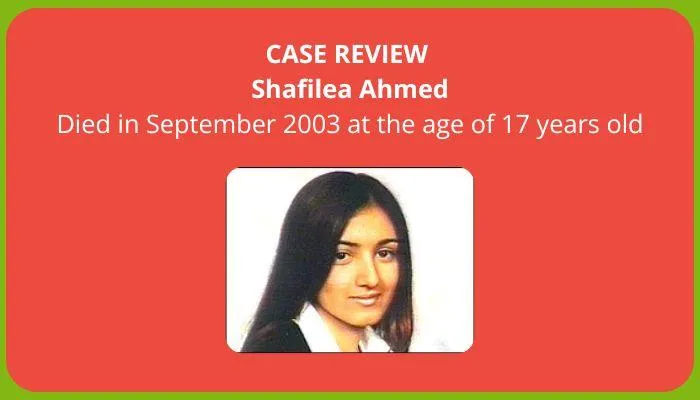Every child's well-being matters.
Case Review Articles
Quick access:
VICTIMS
ADULT ACTIONS
Alison Kelly – data issue
Amina Noor (FGM)
Quick access:
VICTIMS
ADULT ACTIONS
Alison Kelly – data issue
Amina Noor (FGM)

Shafilea Ahmed
Shafilea Ahmed was a 17-year-old British Pakistani girl from Warrington, England, who was murdered by her parents in 2003. Shafilea had been struggling against her parents' strict expectations and their attempts to force her into an arranged marriage. She wanted to live a more Westernised lifestyle, which led to tensions within the family.
In 2003, after returning from a trip to Pakistan where she had reportedly tried to resist a forced marriage, Shafilea disappeared. Her body was discovered months later in the River Kent, and it took several years before her parents, Iftikhar and Farzana Ahmed, were convicted of her murder in 2012. The court heard that they had suffocated her in front of her younger siblings to punish her for rejecting their cultural expectations.
Shafilea had shown signs of distress before her death, including running away from home and confiding in teachers and professionals about the pressure she faced. However, concerns raised by teachers and authorities were not acted upon strongly enough to protect her.
Lessons Learned
Shafilea’s case highlights critical failings in how professionals, including teachers and social workers, respond to concerns about honour-based abuse and forced marriage. Key lessons include:
Understanding Honour-Based Abuse (HBA): It is essential to recognise that some children, particularly those from certain cultural backgrounds, may be at risk of abuse linked to "family honour" if they do not conform to expectations.
Taking Disclosures Seriously: When a child expresses fear about being forced into marriage or harmed by their family, professionals must act immediately rather than assuming it is just a family dispute.
Multi-Agency Collaboration: Schools, social services, and law enforcement must work together to protect vulnerable young people at risk of forced marriage or honour-based violence.
Confidentiality and Safe Reporting: Victims may be in extreme danger if their family becomes aware they have sought help. Professionals must ensure that reporting is done discreetly and safely.
Providing Safe Spaces and Support: Schools and community organisations should offer resources, education, and safe environments for young people experiencing cultural or familial pressures.
What this mean for Early Years Practitioners
Cultural Sensitivity vs. Safeguarding: Respect for cultural differences should never override concerns about a child's safety and well-being. Safeguarding must always come first.
Early Signs of Coercion: While forced marriage usually affects older children and teenagers, early years practitioners should be aware of signs of strict control in young children, such as excessive fear of parents or rigid gender roles enforced at a young age.
Parental Attitudes Towards Education: Some families may resist certain aspects of the curriculum, particularly around relationships and individual rights. Practitioners should be mindful of whether this reflects harmful cultural expectations.
Unusual Extended Holidays: Requests for long absences from school, particularly trips to a parent's country of origin, could be a warning sign. Forced marriages sometimes take place under the guise of family visits abroad.
Limited Independence: If a child is overly restricted in their interactions, such as not being allowed to attend extracurricular activities or social events, it may indicate broader controlling behaviours within the family.
Training and Awareness: Staff should receive training on forced marriage, honour-based abuse, and how to report concerns. The UK’s Forced Marriage Unit (FMU) offers guidance for professionals.
Knowing Reporting Procedures: Any concerns should be reported through designated safeguarding leads (DSLs) and, where necessary, to external safeguarding bodies like social services or the police.
By being aware of these risks and acting early, practitioners can help protect children who may later become vulnerable to forced marriage and honour-based abuse.
AUTHOR:- Iona has nearly 10 years of experience supporting nurseries and childminders in curriculum planning, leadership, and safeguarding. Her writing is informed by public information and sector insight, aiming to provide accessible, practical support for professionals working with children. She is part of the On the Button team, helping deliver Well-being, Safeguarding and Complaint Management Software that empowers practitioners to identify concerns early and act confidently.
On the Button provides innovative software tailored to the needs of the early years sector, with a strong focus on EYFS well-being and early years safeguarding. Our tools help senior practitioners to confidently track concerns, maintain robust records, and respond effectively — all while meeting statutory guidance. From early years complaint management to team-wide safeguarding alerts, our platform puts children's safety and emotional health first.

Shafilea Ahmed
Shafilea Ahmed was a 17-year-old British Pakistani girl from Warrington, England, who was murdered by her parents in 2003. Shafilea had been struggling against her parents' strict expectations and their attempts to force her into an arranged marriage. She wanted to live a more Westernised lifestyle, which led to tensions within the family.
In 2003, after returning from a trip to Pakistan where she had reportedly tried to resist a forced marriage, Shafilea disappeared. Her body was discovered months later in the River Kent, and it took several years before her parents, Iftikhar and Farzana Ahmed, were convicted of her murder in 2012. The court heard that they had suffocated her in front of her younger siblings to punish her for rejecting their cultural expectations.
Shafilea had shown signs of distress before her death, including running away from home and confiding in teachers and professionals about the pressure she faced. However, concerns raised by teachers and authorities were not acted upon strongly enough to protect her.
Lessons Learned
Shafilea’s case highlights critical failings in how professionals, including teachers and social workers, respond to concerns about honour-based abuse and forced marriage. Key lessons include:
Understanding Honour-Based Abuse (HBA): It is essential to recognise that some children, particularly those from certain cultural backgrounds, may be at risk of abuse linked to "family honour" if they do not conform to expectations.
Taking Disclosures Seriously: When a child expresses fear about being forced into marriage or harmed by their family, professionals must act immediately rather than assuming it is just a family dispute.
Multi-Agency Collaboration: Schools, social services, and law enforcement must work together to protect vulnerable young people at risk of forced marriage or honour-based violence.
Confidentiality and Safe Reporting: Victims may be in extreme danger if their family becomes aware they have sought help. Professionals must ensure that reporting is done discreetly and safely.
Providing Safe Spaces and Support: Schools and community organisations should offer resources, education, and safe environments for young people experiencing cultural or familial pressures.
What this mean for Early Years Practitioners
Cultural Sensitivity vs. Safeguarding: Respect for cultural differences should never override concerns about a child's safety and well-being. Safeguarding must always come first.
Early Signs of Coercion: While forced marriage usually affects older children and teenagers, early years practitioners should be aware of signs of strict control in young children, such as excessive fear of parents or rigid gender roles enforced at a young age.
Parental Attitudes Towards Education: Some families may resist certain aspects of the curriculum, particularly around relationships and individual rights. Practitioners should be mindful of whether this reflects harmful cultural expectations.
Unusual Extended Holidays: Requests for long absences from school, particularly trips to a parent's country of origin, could be a warning sign. Forced marriages sometimes take place under the guise of family visits abroad.
Limited Independence: If a child is overly restricted in their interactions, such as not being allowed to attend extracurricular activities or social events, it may indicate broader controlling behaviours within the family.
Training and Awareness: Staff should receive training on forced marriage, honour-based abuse, and how to report concerns. The UK’s Forced Marriage Unit (FMU) offers guidance for professionals.
Knowing Reporting Procedures: Any concerns should be reported through designated safeguarding leads (DSLs) and, where necessary, to external safeguarding bodies like social services or the police.
By being aware of these risks and acting early, practitioners can help protect children who may later become vulnerable to forced marriage and honour-based abuse.
AUTHOR:- Iona has nearly 10 years of experience supporting nurseries and childminders in curriculum planning, leadership, and safeguarding. Her writing is informed by public information and sector insight, aiming to provide accessible, practical support for professionals working with children. She is part of the On the Button team, helping deliver Well-being, Safeguarding and Complaint Management Software that empowers practitioners to identify concerns early and act confidently.
On the Button provides innovative software tailored to the needs of the early years sector, with a strong focus on EYFS well-being and early years safeguarding. Our tools help senior practitioners to confidently track concerns, maintain robust records, and respond effectively — all while meeting statutory guidance. From early years complaint management to team-wide safeguarding alerts, our platform puts children's safety and emotional health first.




Facebook
Instagram
LinkedIn
Youtube